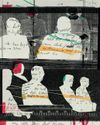
The Neshoba County Fair calls itself Mississippi's Giant Houseparty, because every year the same families return, antlike, to five hundred and ninety-seven individually owned, festively painted cabins there. For a week at the end of July, even many who live nearby move to the fairgrounds, creating an instant community of twenty thousand people, three times larger than the population of the county seat, Philadelphia. The fair, founded in the late eighteen-hundreds in the remote east-central part of the state, has survived two World Wars, the Great Depression, and the coronavirus pandemic because the cabin owners could not bear to give it up. After spraying for bugs, touching up the paint, hanging porch swings, washing linens, changing light bulbs, making beds, and stocking refrigerators (some cabins have four), the families hold the equivalent of Thanksgiving-seven times. There are food hangovers, and hangover hangovers, and children everywhere, only nobody goes home.
A lightly occupied fair cabin sleeps twenty-six; some sleep sixty. Upper floors resemble bunkhouses: bed after bed after bed. The fair is not the place for introverts, neat freaks, sensitives, or anyone who cannot tolerate unrelenting, bone-deep heat. Central air-conditioning is heresy, as is television. Did the fair's founders watch "American Ninja Warrior"? They did not. Indoor plumbing and electricity are acceptable-fans and window units blow wide open. This year, during the hottest month in human history, I stepped into a frigid, empty-looking bedroom and was startled when a teen-ager rose from an upper bunk in a ghillie suit of blankets.
Denne historien er fra October 09, 2023-utgaven av The New Yorker.
Start din 7-dagers gratis prøveperiode på Magzter GOLD for å få tilgang til tusenvis av utvalgte premiumhistorier og 9000+ magasiner og aviser.
Allerede abonnent ? Logg på
Denne historien er fra October 09, 2023-utgaven av The New Yorker.
Start din 7-dagers gratis prøveperiode på Magzter GOLD for å få tilgang til tusenvis av utvalgte premiumhistorier og 9000+ magasiner og aviser.
Allerede abonnent? Logg på

GET IT TOGETHER
In the beginning was the mob, and the mob was bad. In Gibbon’s 1776 “Decline and Fall of the Roman Empire,” the Roman mob makes regular appearances, usually at the instigation of a demagogue, loudly demanding to be placated with free food and entertainment (“bread and circuses”), and, though they don’t get to rule, they sometimes get to choose who will.

GAINING CONTROL
The frenemies who fought to bring contraception to this country.

REBELS WITH A CAUSE
In the new FX/Hulu series “Say Nothing,” life as an armed revolutionary during the Troubles has—at least at first—an air of glamour.

AGAINST THE CURRENT
\"Give Me Carmelita Tropicana!,\" at Soho Rep, and \"Gatz,\" at the Public.

METAMORPHOSIS
The director Marielle Heller explores the feral side of child rearing.

THE BIG SPIN
A district attorney's office investigates how its prosecutors picked death-penalty juries.

THIS ELECTION JUST PROVES WHAT I ALREADY BELIEVED
I hate to say I told you so, but here we are. Kamala Harris’s loss will go down in history as a catastrophe that could have easily been avoided if more people had thought whatever I happen to think.

HOLD YOUR TONGUE
Can the world's most populous country protect its languages?

A LONG WAY HOME
Ordinarily, I hate staying at someone's house, but when Hugh and I visited his friend Mary in Maine we had no other choice.

YULE RULES
“Christmas Eve in Miller’s Point.”